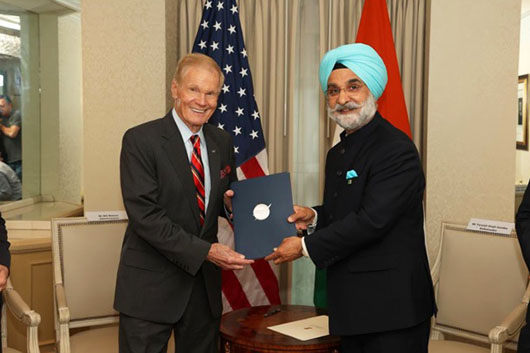Special to CosmicTribune.com, June 28, 2023
By Richard Fisher
Since India its gained independence from Britain’s colonial rule in 1947, American leaders have been trying to convince the leaders of the world’s largest democracy to join in longstanding efforts to advance freedom, or to even combat its dire enemies.
But on Earth as in space, India instead forged an independent path, from Pandit Nehru’s increasing strategic embrace of the Soviet Union as New Delhi proclaimed “nonalignment” and then post-Cold War “strategic autonomy,” avoiding a deep strategic embrace of the United States even as Communist China loomed as an existential threat.

In space, this continued into the present era in the form of India’s partnership with Russia’s Roscosmos to develop its Chandrayaan unmanned Moon lander, its 8.2-ton Gaganyaan manned spacecraft and its 20-ton Indian Space Research Organization (ISRO) Space Station.
The Chandrayaan Moon lander shows influence from the Soviet era Lunniy Koryable (LK) manned Moon lander, with the Chandrayaan-3 scheduled in July 2023 to attempt India’s first unmanned Moon landing, with the Chandrayaan-2 mission having failed in 2019.
Russia is also currently assisting with the training of Indian astronauts for the first manned Gaganyaan mission scheduled for late 2024 or early 2025.
Meanwhile, especially since the beginning of the International Space Station (ISS) in 1998, the United States has sought to develop an active manned space cooperation program with India, even though there had been considerable technical space cooperation with India since the 1960s.
However, consistent with the policy of avoiding close alliance-like cooperation with Washington, New Delhi refused to send its astronauts to the ISS.
In April 2022 Dr. S. Somnath, Chairman of ISRO said, “We did not join ISS because in our assessment, we didn’t find merit in joining it.”
But in an historic step away from “strategic autonomy” and toward cooperation with the community of democracies — at least in space — on June 22 India became the 27th signatory of the 2019 Artemis Accords.
This happened on June 21, just before Indian Prime Minister Nahendra Modi’s June 22 Summit in Washington, D.C. with President Joe Biden, during which India and the U.S. also agreed to significantly increase defense cooperation.
But regarding space, on June 22 Modi stated, “We have decided to join the Artemis Accords. We have taken a giant leap in our space cooperation. In short, I would say even the sky is not the limit for cooperation with the U.S.”
Full Text . . . . Current Edition . . . . Subscription Information

You must be logged in to post a comment Login